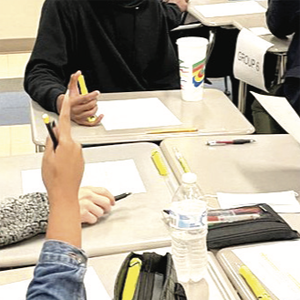Alabama school districts are getting creative in how they recruit and retain teachers. One solution: Paying student interns during their time in the classroom.
Two experiments are underway, AL.com found.
The first, started during the pandemic, allows schools to pay student interns to lead a classroom – without a lead teacher overseeing them. The second will begin in January, when Tuscaloosa City begins paying student interns a stipend during their traditional internship teaching alongside a lead teacher.
Paying student interns and giving them sole, long-term control over a classroom is relatively new to Alabama — but it’s a solution that more schools across the country are interested in. Historically, students take unpaid roles in local schools while they finish coursework and study for certification exams.
Karissa Martin taught a first grade classroom in Lauderdale County for the last two and a half months of the 2021-22 school year, acting as a long-term substitute while working on her degree at the University of North Alabama. She said it was challenging to lead a classroom on her own with no real experience doing so.
“When you’re doing your internship with another teacher in the room, they can kind of intervene or you can step aside and ask them [for help],” Martin said. “When I was in there by myself, if it was something that I just absolutely didn’t know, I would say we’ll talk about it later. And then I would ask the other teachers at lunch or I would call my professor after the school day was over.”
But, she said, she is thankful for the experience and felt better prepared for teaching fourth grade in Huntsville this year.
Several other states have tried different approaches to attract and retain prospective teachers with paid roles, including West Virginia paying non-traditional teacher candidates during apprenticeships and Colorado using federal COVID relief money to pay income-eligible interns to teach while learning.
Alabama student interns are leading classrooms
Allowing interns to lead their own classroom is a solution that came as schools struggled to find substitute teachers during the pandemic.
University of North Alabama Education Dean Katie Kinney said school districts began asking colleges if interns could lead classrooms on their own to fill vacancies. The state department of education said yes, and before long, student interns were leading classrooms across the state.
If an intern is serving as a long-term substitute in a Title I school for four or more consecutive weeks, federal education regulations require the school to notify parents.
Because interns were covering the classroom on their own – in essence acting as substitute teachers – districts began paying them as such, either a daily rate or as a long-term substitute.
According to the Alabama State Department of Education, about 50 student interns are leading classrooms and being paid as long-term substitutes for the current school year.
Two student interns worked as long-term substitutes last year, and that was a first for UNA, Kinney said. This year, half a dozen student interns trained by the university already are leading classrooms.
It makes sense for teacher interns to get paid, Kinney said, as other areas of the university, like engineers and business disciplines, students get paid for their internship, too.
But Kinney said she has concerns about putting interns into the classroom too early, saying learning instructional skills is a process.
Teacher candidates typically do a semester-long internship as the last thing they do before graduation; learning under a lead teacher helps student interns get comfortable with the pace of a classroom and deal with the variety of challenges that come up during the day, Kinney said.
“Anytime we rush developmental processes, there have to be additional supports [for the intern],” Kinney said. “Some of our students are 100% ready and if they don’t have that support in their classroom 24/7 they’ll be okay as long as they have somebody that they can call, whether it’s an instructional coach or a reading coach.”
Paying stipends for interns to learn alongside a teacher
Tuscaloosa City Schools is also trying something new with its student interns: Paying them during their internship if they commit to teaching in the district after graduation.
Superintendent Mike Daria said the district will pilot a program to pay up to 10 student interns during their internship – which will be a traditional internship, complete with a lead teacher to oversee the intern. Students will receive $1,200 each beginning in January.
“As we meet interns who are in our schools and who are interested in remaining as a full time teacher, we will hire them and start paying them a monthly supplement while they’re doing their internship,” Daria said. ”And then they already have a job for August of 2023.”
“This is a way for us to get an early commitment from them, and also take care of them with the supplement to keep them in the system.”
Daria said currently the district has two student interns serving as long-term substitutes, but that the new pilot should be seen more as an “early commit” program.
This is just one of many ways the state has widened pathways into the classroom over the past few years as schools were already having a hard time hiring teachers in certain fields like high school math and science and in special education prior to the pandemic.
In 2019, state education officials extended the time a teacher can teach on an emergency certificate from a maximum of one year to four years, allowing non-traditional candidates – like those taking on teaching as a career change – a longer time to pass required teacher tests.
And earlier this year, officials allowed various combinations of GPAs and teacher test scores to serve as final certification requirements.
But now, with districts having a hard time finding elementary teachers–once plentiful across most districts – all flexibilities are welcome, Daria said.
Daria said schools have been a part of workforce development for years, but haven’t done a great job of developing their own teacher workforce. The pilot program has promise, he said, but it will take time to see if it’s successful.
For her part, Martin said being a first-year teacher – with or without the traditional student intern experience – is hard. “Especially when you’re first starting out,” she said, “we’re still just trying to figure it all out ourselves.”
“You can prepare as much as you want,” she added. “But in the long run, each class, each student is different. And so it takes time getting to know your class, know your student and know your own style as a teacher. And all of that just comes from experience. And when you’re first starting out, you just don’t have that experience yet.”
“It’s important for parents to have grace and remember that we’re learning, too.”











